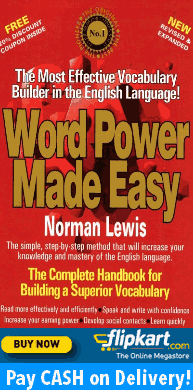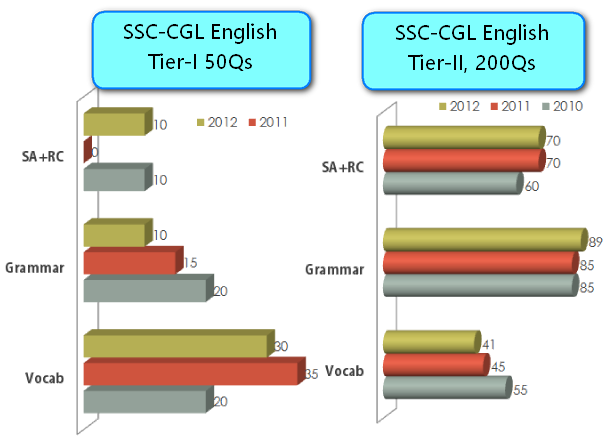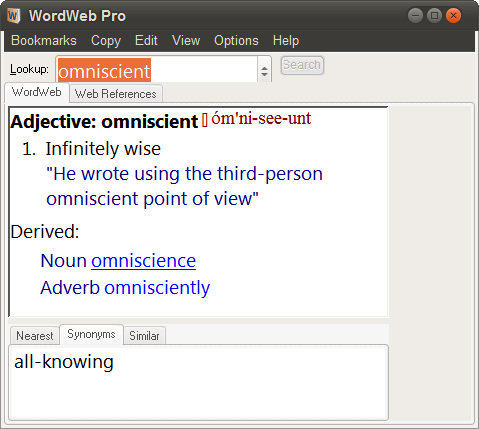- Introduction
- Topic-wise breakup for SSC-English (tier I and II)
- Overall: SSC-English (Tier 1 And 2)
- Vocabulary?
- English Grammar: Approach
- Comprehension + Sentence Arrangement
- Recommended Book for English Grammar
Introduction
In the previous articles we saw how to approach
| General Awareness for Tier I | Click me |
| Maths / Quantitative Aptitude for Tier I and II | Click me |
| Reasoning/ General Intelligence for Tier I | Click me |
In this article, we’ll see how to approach English for SSC-CGL exam.
In the SSC exam, you have to face English at two stages
| Tier I (prelims) | 50 questions (other 150 question will come from GK, Maths and Reasoning) |
2 hours |
| Tier II (mains) Paper II |
200 questions | 2 hours |
- Negative marking: Yes
Topic-wise breakup for SSC-English (tier I and II)
Vocabulary
| Tier I | Tier II | |||||
| 2010 | 2011 | 2010 | 2011 | 2010 | 2011 | |
| Antonym | 5 | 5 | 5 | 5 | 5 | 3 |
| Synonym/Substitution | 10 | 5 | 10 | 10 | 10 | 15 |
| Idioms | 0 | 5 | 5 | 5 | 5 | 10 |
| Spelling | 5 | 5 | 5 | 5 | 5 | 3 |
| Fill In Blanks | 0 | 15 | 5 | 30 | 20 | 10 |
| Vocab Subtotal | 20 | 35 | 30 | 55 | 45 | 41 |
Grammar
| Tier I | Tier II | |||||
| 2010 | 2011 | 2012 | 2010 | 2011 | 2012 | |
| Sentence Correction | 5 | 5 | 5 | 20 | 20 | 20 |
| Sentence Improvement | 5 | 5 | 5 | 20 | 20 | 22 |
| Direct-Indirect | 5 | 5 | 0 | 25 | 25 | 27 |
| Active-Passive | 5 | 0 | 0 | 20 | 20 | 20 |
| Grammar Subtotal | 20 | 15 | 10 | 85 | 85 | 89 |
Sentence Arrangement + Comprehension
| Tier I | Tier II | |||||
| 2010 | 2011 | 2012 | 2010 | 2011 | 2012 | |
| Sentence Arrangement | 5 | 0 | 0 | 10 | 20 | 20 |
| Comprehension | 5 | 0 | 10 | 50 | 50 | 50 |
| Subtotal | 10 | 0 | 10 | 60 | 70 | 70 |
Overall: SSC-English (Tier 1 And 2)
| Tier I | Tier II | ||||||
| 2010 | 2011 | 2012 | 2010 | 2011 | 2012 | ||
Vocabulary |
|
20 | 35 | 30 | 55 | 45 | 41 |
Grammar |
|
20 | 15 | 10 | 85 | 85 | 89 |
Comprehension |
|
10 | 0 | 10 | 60 | 70 | 70 |
| Total | Grand Total | 50 | 50 | 50 | 200 | 200 | 200 |
- The SSC exams, the English questions usually come in the multiple of “fives” e.g. 5 question on synonyms, then 5 on antonyms and so on. (tier 1)
- Similarly in tier-ii, 10 questions on fill in the blanks, 20 questions on active passive and so on.
- Please do not live in overconfidence that “SSC is a “pappu” exam and I’m a master of English. so I don’t need to prepare anything for vocabulary or grammar.“
- If you observe the previous SSC papers particularly the tier-II papers of English, the vocabulary portion is not “pappu” at times, they ask meaning of words that are not used in the day to day English.
- Similarly, a lot of things that we say and write in English in our day-to-day life, are not grammatically correct. So you may not be able to tick the right choice in sentence correct/ improvement question.
First of all, get a fullscape notebook / diary. Divide it into two parts
- Grammar
- Vocabulary. (last 50 pages)
Vocabulary?
Vocabulary is of critical importance in SSC exam because of following reasons
- There are direct questions on synonyms, antonyms, idioms and phrases.
- You can read the passage faster, if your vocabulary is good, else you’ll have to pause and think.
- In comprehension passages, some questions are in the format of “what is the meaning of XYZ word in the sentence”
Apart from SSC, if you’re planning to appear for CAPF , LIC or PSU exams – they usually have a descriptive paper (précis, letter writing, essay etc.)
- If you’re planning for UPSC, or State PSC, both have compulsory English paper during Mains. Again (précis, letter writing, essay etc.)
- So, you’ll have to write English essay someday and without good vocabulary you can’t write a decent essay.
How to improve vocabulary?
- There is no dearth of ready-made books in the market for “vocabulary”.
- Any Tom Dick or Harry can download a list of synonyms, antonyms, idioms and phrases from Google search and publish a book.
- But such books are useless because unfamiliar words don’t stay long-term memory.
Vocab: Basics
 |
|
How-to approach Norman Lewis?
From outside, the book looks very thick and heavy just like Manorama yearbook. But actually this book is written in a very lucid, easy, reader friendly language. You can read it like a storybook after-dinner.
Structure of the book
Basics of vocabulary |
|
Appendix |
|
Vocabulary: Advanced
- Download free software called “WordWeb”: http://wordweb.info/free/
- It is also available for android phones, tablets etc. for free (links on the same site).
- Keep a habit of reading in English on daily basis- be it English-newspaper, magazine or some web-article.
- While reading such things, whenever you come across any difficult word- note down in your diary, along with the sentence in which it appeared. (please keep in mind that absolute words do not stay long-term memory. You have to connect them with a sentence or context.)
- Then lookup for its meaning in the Wordweb software, and write down the meaning back in your diary/notebook.
- Repeat this exercise, until you’re selected in some exam.
This pretty concludes the approach for Vocabulary.
Moving to the next topic:
English Grammar: Approach
In the SSC exam, you have to face English grammar in following areas
- Sentence correction
- Sentence improvement.
- Active passive
- direct indirect speech
Approaching Grammar
Task #1: Active Passive (voice) and Direct-Indirect (speech)
- This is no-excuse topic. Because it relies on a set of simple rules, almost like math formulas.
- And usually Tier I has 10 questions on Voice+speech
- and tier-II has almost 40-45 questions on these two topics alone.
- Understand the grammar rules and practice maximum questions.
- In your “diary” note down any special/odd rules you come across- including example sentences.
Task #2: Sentence Correction+Improvement
To master sentence correction, you’ve to master two subtopics:
- Grammar rules
- Phrasal verbs
Grammar Rules
- First of all you need to know the grammar rules. But you don’t need to know all grammar rules!
- Because in competitive exam, sentence correction relies on certain specific mistakes only.
For example: The topic “verb” has lot of theory and classifications.
But for “sentence correction”, it boils down to very few rules for example
- Either, Neither, none, each and every is singular.
| Wrong | Each of the soldiers are disciplined |
| Right | Each of the soldiers is disciplined. |
Your task = first go through your grammar book, and note down such rules with example statements, in your note book. Revise these rules often (along with example sentences).
Phrasal Verbs
- Grammar rules are like maths. Universal valid.
- But Phrasal verbs are different game altogether. You need to know memorize the correct usage- case to case basis. For example:
| Correct phrasal verb | Wrong Usage |
| Dispose of= sell. | He has decided to dispose off his property. |
| Dispose to= willing, interested. | He is disposed in discussing that business proposition. |
- Both statements are wrong because phrasal verbs are incorrectly used.
- Many a times, candidates know the grammar rules very well, but they fail to detect the error in sentence because they’ve not prepared the phrasal verbs.
- Standard English has truckload of phrasal verbs. But you should at least know the top/common 200 of them. (can be goggled and also available in various grammar books).
- You next task: revise the list often and write down the very confusing ones into your diary: with example sentence.
Once this is done, try to solve as many practice questions as you can.
Comprehension + Sentence Arrangement
- Just one word: Practice.
- The best source for practice= old papers of SSC, IBPS.
Recommended Book for English Grammar
 |
|
Note: Arihant publication has released multiple books on English grammar and two of them have similar sounding names. So please donot mixup.
| Author | Pages (approx.) | Comment | |
| General English for All Competitive Examinations by S.C.Gupta | S.C.Gupta | 370 | Not recommended because it contains mostly practice tests and very few rules on grammar= not comprehensive enough. |
| Objective general English by SP Bakshi. | S.P.Bakshi | 730 | This is the recommended book. |




![[SSC] CGL 2014 Tier-2 Result, Cutoff, Answerkeys out, Interviews to begin in June, Tips for Typing Test](https://mrunal.org/wp-content/uploads/2015/05/c-t2-result-500x383.jpg)

![[Download] SSC Question Papers 2014 Tier 1: Both 19th & 26th October with Official ANSWERKEYS & UP-RO, CPO, T2-Stats](https://mrunal.org/wp-content/uploads/2014/10/Cover-SSC-2014-T1-Papers-500x383.jpg)
56 yr old Telecommunications Community Engineer Rodger from Madoc,
usually spends time with hobbies like bonsai trees, Poker 99 and
cloud watching. Finds the entire world an fascinating place following
2 days at Gondwana Rainforests of Australia.
The information given in the article is helpful for SSC aspirants. Thank you for such detailed information in systematic way
I want to score 530+
And i am and st candidate
I think GKP – CL media LTD BOOK ENGLISH WIZARD by A P Bhardwaj is also a very good book.
It covers vocabulary, grammar, comprehension and other parts like sentence completion , reordering of jumbled sentences and other topics are covered comprehensively
Sir can you please guide us any new strategy for ssc cgl or we should go through the same strategy that explained by you earlier.